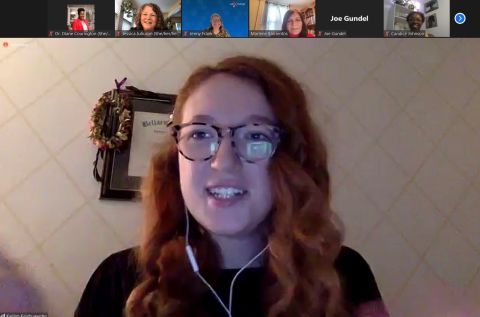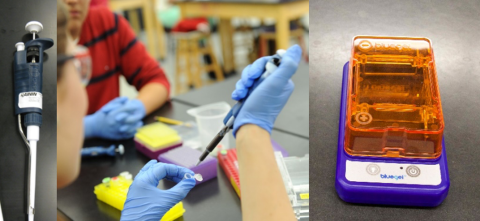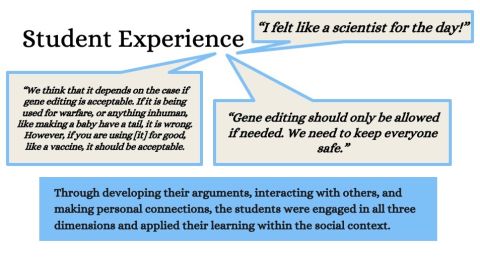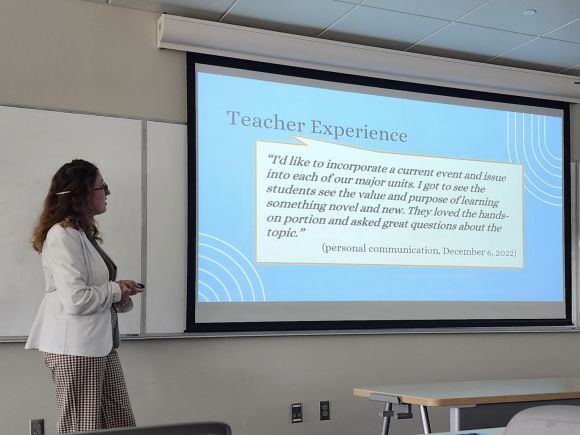In the last weeks of May, after finishing her honors thesis and graduating with a biology degree from Bellarmine University, Kaitlyn Kalehuawehe made an unexpected visit to North Oldham Middle School, north of Louisville, KY. It was not her first time visiting the school: In November of 2021, she introduced two North Oldham classrooms to a lesson about genome editing that she developed in collaboration with ABE Kentucky. Now she was returning by popular demand as students heard about her innovative lesson from their peers.
“The teacher reached back out to me and said, ‘Hey, word is spreading throughout the school that these students had this opportunity, especially seventh graders in different classes, and we would love for you to come back and teach the remaining ones in the other classes,’” Kalehuawehe says. It was a rewarding culmination to a project 2 years in the making.
While a junior at Bellarmine, Kalehuawehe knew she did not want to do a traditional lab-based project for her Honors Program undergraduate thesis. Instead, she was drawn toward education, wanting to find a way to make science more fun for students. Her thoughts went to middle school, a time not as often targeted in science education but that was critical in her own pathway.

“Middle school is when you're starting to find out who you are and what your likes and dislikes are,” she explains. “And middle school is when you have all these questions in your head that you are trying to make sense of.” Her research also revealed that early adolescence is a time of neurodevelopment in cognitive-thinking skills, furthering her desire to work with middle schoolers.
Kalehuawehe’s advisor Kristin Cook, PhD, is part of the ABE Kentucky team and immediately made the connection, suggesting Kalehuawehe leverage the experience of the ABE program to develop her lesson for middle schoolers. She was quickly off the ground and running: The ABE Kentucky team linked her up with a seventh-grade teacher at North Oldham, introduced her to ABE labs and equipment, and brainstormed with her on ways to adapt existing materials to suit a younger audience that may not have some of the foundational information on genomics yet.
For Kalehuawehe, it was important that the lesson hit on socioscientific issues (SSI). “This is a relatively new way of teaching science, where it focuses on a social issue based in science that has other elements, whether economic, political, ethical, etc.,” she says, “so that you can help students engage in meaningful conversations.”
With that in mind, Kalehuawehe homed in on an ABE lesson about CRISPR and designer babies. “I had to go back to the basics because middle schoolers haven't seen DNA and genes before, so I had to set up a baseline of information first.”

She also got help from Tara Bristow at the ABE Program Office, who helped brainstorm new ways to frame genome editing. “Tara said I could start with stuff like ‘Hey, have you ever wanted to have a dog with tentacles?’ and other outlandish combinations,” Kalehuawehe recalls, while also introducing her to lessons other classrooms had done, such as discussing genome editing in the context of the novel Frankenstein. “So I was able to grab bits and pieces from a little bit of everything to mold the lesson for a different audience.”
Ultimately, the lesson included an introduction to ABE skills and equipment as well, including pipetting gels, so the students could see and practice a real lab technique. The lab aspect helped to also tie back to Kalehuawehe’s own lab experiences at Bellarmine, so the seventh graders could connect their work to potential future aspirations.
Kalehuawehe’s own interest in science stems from a desire to dig for answers. “It wasn't like math where you did a problem and in the end, had an answer and kind of moved on,” she says. “With science, there's always more to find, there's always more to discover.”
She has also wished more people could appreciate science in the same way she does. “Especially right now with the effects of the pandemic, you're seeing more drop-off in science and in education,” she says, “but I just feel like there's this sense of wonder in science, and I think we should all dive in with it.”
The students at North Oldham did just that—dove into her ABE-based lesson with gusto. From just a couple short days of work with the students, Kalehuawehe’s research found that the students became deeply engaged in the topic of genome editing through the lesson. Her research included surveying the teachers and collecting notes and impressions from the students. Most exciting, she says, was to see all their unexpected questions. “They brought up topics that I didn't even think about when it came to genome editing,” Kalehuawehe says.

Returning to North Oldham after graduating to teach the lesson to more students, Kalehuawehe felt even more drive toward education. While she is interested in a career in healthcare, she cannot stop thinking about ABE and hopes to continue working with the program, whether as a volunteer or through other opportunities. “I love education and outreach, and I think more people should work on it,” she says, “especially more college students, so they can see how you can change young minds to get them to love science as much as we do.”
